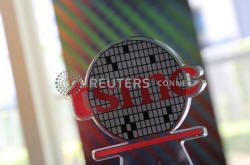Taiwan's TSMC to build Arizona chip plant as U.S.-China
tech rivalry escalates
 Send a link to a friend
Send a link to a friend
 [May 15, 2020] By
Stephen Nellis and David Shepardson [May 15, 2020] By
Stephen Nellis and David Shepardson
(Reuters) - Taiwan Semiconductor
Manufacturing Co Ltd <2330.TW>, the biggest contract chipmaker, said it
plans to build a $12 billion factory in Arizona in an apparent win for
the Trump administration's efforts to wrestle global tech supply chains
back from China.
The plan, which will create over 1,600 jobs, comes as U.S. President
Donald Trump steps up criticism of Chinese trade practices and Beijing's
handling of the novel coronavirus ahead of the Nov. 3 U.S. presidential
election.
Trump has long pledged to bring manufacturing back from overseas and now
a steep economic slump brought on by the coronavirus is driving a
government-wide push to end U.S. production and supply chain dependency
on China.
U.S. Secretary of Commerce Wilbur Ross touted the deal as "another
indication that President Trumpís policy agenda has led to a renaissance
in American manufacturing."
TSMC is a major supplier to U.S. tech giants such as Apple Inc <AAPL.O>
and Qualcomm Inc <QCOM.O>, as well as Chinese firms like Huawei
Technologies [HWT.UL], which Washington has put on a trade blacklist.

"This project is of critical, strategic importance to a vibrant and
competitive U.S. semiconductor ecosystem that enables leading U.S.
companies to fabricate their cutting-edge semiconductor products within
the United States," TSMC said.
While huge in terms of foreign investment in the United States, the plan
is small by TSMC's standards. For 2020, TSMC's capex plan is $15-$16
billion.
The Taiwanese chipmaker said the plan was to build the plant over nine
years.
"The budget... suggests the eventual scale won't be big," Bernstein
analysts said in a note, adding revenue contribution from the plant will
stay at around 3%-4%.
"The scale and technology is similar to what TSMC did in China,
suggesting a balance between the US & China."
A U.S. Commerce Department official said TSMC's decision to locate the
plant in the United States generated "good will" at the department, the
drafter of a law that would, if implemented, severely restrict TSMC chip
sales to Huawei.
Credit Suisse analysts said proposed restrictions could threaten TSMCís
14% of sales from Huawei, escalate U.S.-China tensions and delay the
rollout of the next-generation 5G mobile network.
"While it is hard to be certain, we believe that TSMC announcing a U.S.
Fab could remove the threat of further Huawei restrictions in the very
near-term at least," JP Morgan analysts said in a note.
Shares of TSMC, the world's most valuable semiconductor company with a
market capitalisation of about $255 billion, exceeding Intel Corp's <INTC.O>,
closed up 1.7% on Friday, outperforming a 0.3% gain in the main Taiwan
stock market <.TWII>.
[to top of second column] |

A logo of Taiwan
Semiconductor Manufacturing Co (TSMC) is seen at its headquarters in
Hsinchu, Taiwan October 5, 2017. REUTERS/Eason Lam

ADVANCED CHIPS
The plant, the biggest foreign investment by TSMC, will produce the most
sophisticated 5 nanometer chips, which can be used in high-end defense and
communications devices.
TSMC manufactures the bulk of its chips in Taiwan and has older chip facilities
in China and Washington state.
Its chips power Apple's iPhones and the iPhone maker works closely with TSMC to
become the first to take advantage of new advances in its chip-making processes.
U.S. Secretary of State Mike Pompeo said chips from the new TSMC plant will
power everything from artificial intelligence to 5G base stations to F-35
fighter jets.
Semiconductors play a key role in both consumer electronics and defense
equipment. The vast majority of the most advanced chips are made in Asia, which
has caused concern among U.S. officials as a strategic rivalry with China
deepens over the origins of the deadly coronavirus.
While Intel has major manufacturing operations in the United States, it supplies
only its own chips rather than making them for outside customers.
The Trump administration has been in talks with both Intel and TSMC to build a
plant in the United States, and Intel said last week it was in discussions with
the Department of Defense about improving domestic sources for microelectronics
and related technology.
The TSMC announcement is not expected to derail the Pentagonís efforts to
bolster the supply chain for microprocessors, despite the Commerce Department's
working on the TSMC deal independently, a person familiar with the matter said.
Apple and Intel declined to comment.
TSMC said that construction of the Arizona facility would begin in 2021 with
production targeted to begin in 2024, and that it would be able to process up to
20,000 silicon wafers per month. Each wafer can contain thousands of individual
chips. The investment will be made from 2021 to 2029.

The Wall Street Journal first reported the latest details of TSMC's plans.
(Reporting by Stephen Nellis in San Francisco, and David Shepardson, Alexandra
Alper and Mike Stone in Washington, Karen Freifeld in New York; Yimou Lee in
Taipei; Writing by Miyoung Kim; Editing by Leslie Adler, Muralikumar
Anantharaman and Stephen Coates)
[© 2020 Thomson Reuters. All rights
reserved.] Copyright 2020 Reuters. All rights reserved. This material may not be published,
broadcast, rewritten or redistributed.
Thompson Reuters is solely responsible for this content. |